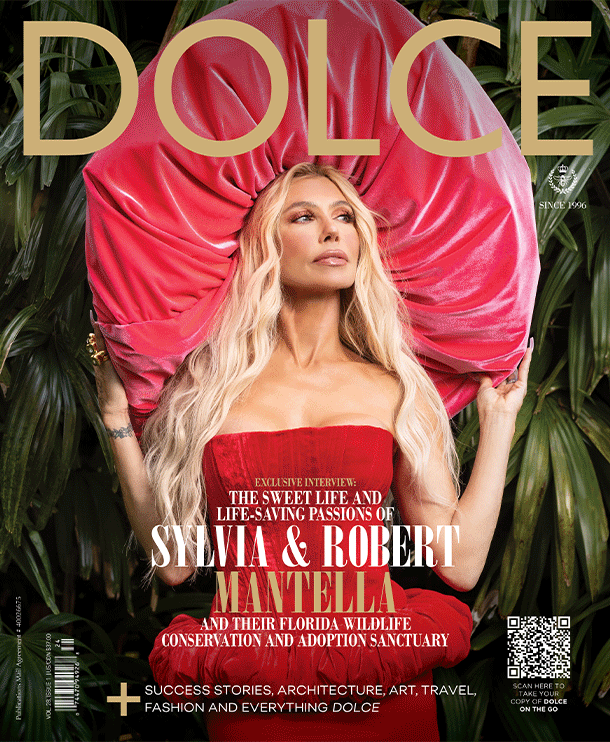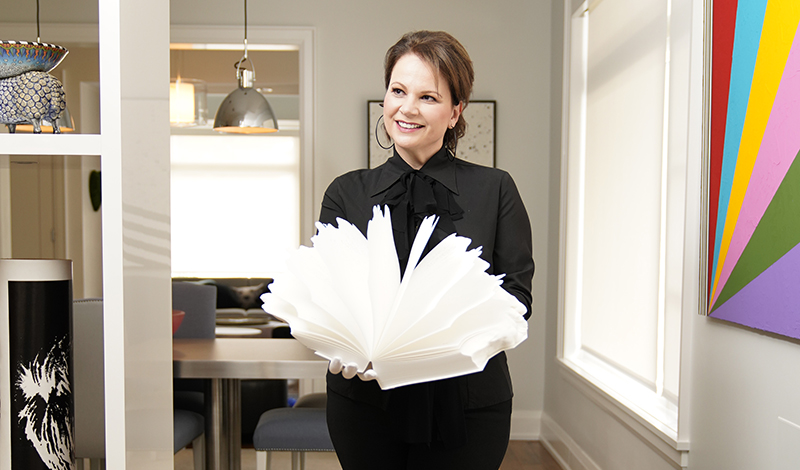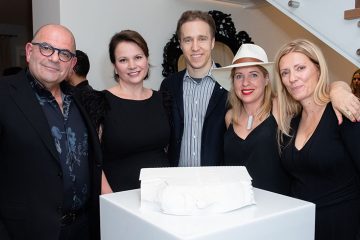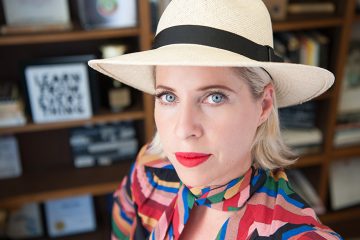Julie Toskan: Renegade For Good
A visionary whose life purpose is centred around making an impact for the better, both domestically and internationally, Julie Toskan is driven by challenges, compassion and change for good.
Loosely described, a visionary is someone who has unusually keen foresight, one who can aptly envision the future. The visionary process can be achieved through formal practices such as meditation and dreams. Or, in Lotus Land culture, the aids to “envisioning” are sometimes accessed through attempting to connect with supernatural powers, often and quite possibly aided and abetted by the use of mind-altering drugs.
To be described as a visionary is a positive valuation and one that is certainly appropriate for Julie Toskan, CEO at Genius 100 Visions. Without a doubt, Toskan, a change-maker to her core, is in the most esteemed company. Martin Luther King Jr., whose hopes and actions championed equality and seamless integration for all cultures and races, is unquestionably a visionary. So, too, are Leonardo da Vinci, President Franklin D. Roosevelt and Albert Einstein, the ultimate visionary. Completely unabashed by hundreds of failed experiments, Einstein used the information gleaned from his realms of failures as teachable moments from which to envision the path forward. In fact, more than 100 years after the anniversary of Einstein’s general theory of relativity, Genius 100 Visions created the 3D-printed book Genius: 100 Visions of the Future with designer Ron Arad. The book, which through a partnership with NASA saw a copy prototyped in space, features 100 eminent global thought leaders across a broad spectrum of genres. These include award-winning actress and singer Barbra Streisand; bestselling author and renowned pioneer in integrative medicine Deepak Chopra; human rights activist and 2018 Nobel Peace Prize recipient Nadia Murad; and zen master and global spiritual leader Thich Nhat Hanh, to name just a few.
“Of course, it couldn’t just be a regular book,” Toskan says. “Someone had a connection to NASA, so a decision was made to make a prototype copy of the book in space. With the help of gravity, the pages of the book flip on their own, which was discovered as the book was being created on the 3D printer in space.”
“I Believe Very Strongly That Change Needs To Happen In The Communities Where Change Is Needed”
Just as she was playing with the idea of retiring (“I really don’t know what I was thinking”), Toskan met Rami Kleinmann, the founder of the Genius Foundation, which was established as an offshoot to the Genius: 100 Visions of the Future book. “He asked me what I was going to do next,” Toskan says. “I told him I was looking to find the next great thing that I could get involved in [and] not from a monetary perspective, but as an impact for the betterment of people.”
Intuiting that Genius: 100 Visions of the Future would give her the opportunity to work on many great and visionary ideas, Toskan was in. In November 2018, she became a part of the Genius organization just as it was ramping up.
A current partnership that Genius is working with involves a group in Nepal who help people with cataracts see again. People, who seven minutes earlier could not see, come out of the surgical room and experience the light of day and the lights of their life. Many situations in which Genius is involved are already in place. But with the organization’s help, procedures and causes become more efficient and better funded. “We are not really out there creating new things; there are already a great amount of ideas out there. But a lot of these organizations just need support. And so it is incredible to see that something that really costs so little can have such an impact,” Toskan says. “For example, a mother who had never seen her child, who couldn’t function properly, cook or clean, is now able to see. A father, now sighted, can go out to work, to support his family. It changes the whole dynamic in people’s lives. It is all about making the greatest impact and maximizing resources, either financially or those we already have as a group,” she says.
A “take-the-bull-by-the-horns” kind of person, Toskan’s intrinsic purpose stems from her deep dislike of seeing injustices and unfairness befall people. “That is what has driven me to do the work I do, with respect to helping people experience a better life. I am passionate about exposing people to experiences that they might not otherwise have access to. I like to root for the underdog; challenges really drive me. If someone tells me I can’t do something, I go ahead and do it, even if I don’t have a clue,” Toskan says with a laugh.
Open to opportunities as they present themselves, Toskan’s career trajectory began at 18 years of age, just as she was graduating from high school. Her brother Frank Toskan (15 years his sister’s senior) and his life and business partner, Frank Angelo, the “Two Franks” as they came to be known, invited Toskan to join a company they were in the throes of creating. “I was very lucky to have a brother who was absolutely brilliant,” Toskan says. “It was his idea to start M.A.C [a cosmetics company]. I got to be a part of that fantastic team, where everyone had different skill sets. The Two Franks were mentors to me, taught me so much and showed a great deal of confidence in me,” says Toskan. “They were true renegades for good. Everything had to be the best: the cosmetics had to be the best quality; the price had to be affordable; everything came from a genuine, honest perspective. I consider myself deeply lucky to be a part of that great venture, to grow up that way.”
In 1999, after a very successful run, the M.A.C team sold the company to multinational cosmetics and skin-care giant Estée Lauder. Tragically, just as the sale was being facilitated, Frank Angelo passed away.
But the brother and sister team forged on, and, along with Toskan’s then husband, created the family-based organization Toskan Casale Foundation. Its main mission and purpose were to provide immediate help to at-risk people, while building compassion and empathy. These visionaries had the organizational experience running both M.A.C and M.A.C AIDS fund to make this new organization a definitive and change-making success. “One of M.A.C’s core philosophies centres on its products being for everyone, for all sexes and all races. It was groundbreaking at the time because people with AIDS were looked down on. It was considered a gay man’s disease, which promoted the opinion that a person with AIDS deserved it. It was absolutely horrible,” Toskan says. “The Two Franks, who had been on a trip to New York, came home determined to do something for the AIDS cause. They told me they had found someone who was a perfect spokesperson for the M.A.C AIDS Fund — RuPaul, a 6’4” black male drag queen who looks amazing in makeup. I was worried about customers’ reactions to this choice, but the Franks told me, ‘Julie, if you get complaints on this, it is a perfect opportunity to open the dialogue and talk to them about our cause.’ RuPaul is for all sexes, all races, all ages. He is playful — a perfect choice.”
M.A.C’s second spokesperson was k.d. lang, another memorable change-maker. And when Estée Lauder took over M.A.C in 1999, it continued to raise money for AIDS, to the tune of US$500 million, all through the sale of one product, Viva Glam lipstick. “Every retailer that we worked with gave up the full markup on Viva Glam sales,” Toskan says. “[And] 100 per cent of the sales on this product went to the AIDS foundation.”
After Toskan left M.A.C, she began looking for a cause that would have immediate impact in local communities. This led to the 2002 creation of the Youth and Philanthropy Initiative (YPI), www.goypi.org, which was really Toskan’s baby. A school-based program that connects students with their community’s needs, a curriculum was developed for high-school students that engages all the classes across a particular grade. The backbone of the YPI (which became a free-standing charity three years ago and for which Toskan is the chair) requires students to choose a cause or a problem in their community that is of interest to them, that speaks to them. Students then make a compelling argument for their chosen cause to their classmates. All of the money granted, $5,000 per bursary, is based on the research that these high-school students effect. “The student efforts fulfill immediate needs within the social sectors of their communities,” Toskan says. “It is hard for students who might have been to a shelter in their community to return to class and say, ‘OK, I learned about that and now I am going to walk away.’ A mandated part of the program is that students have to go out into the community and visit the charity or shelter that they have chosen to make a case for.”
The scope of the YPI is large. Last year alone, 400 schools participated internationally across Canada, Scotland, Northern Ireland and New York City, with more than $1 million being granted annually. And plans are in the works to expand out along the Eastern Seaboard.
“It is an incredibly empowering program that creates awareness for young people, even if they don’t win grant money,” Toskan says. “I believe very strongly that change needs to happen within the communities where change is needed. It is not about it being my ideas; it is about helping people with their ideas, their passions. That is at the core of what I do, which is what drives me to assist the young people involved in YPI.”
While the perception might be that students would gravitate toward a youth-oriented charity, the first grant awarded when YPI launched was for Sheena’s Place, an organization that provides support for eating disorders. At that time, it was women-centric. It was a poignant choice because the group of young male students went outside of themselves to study an issue that primarily affects women and girls. Other examples include kids choosing shelters to champion, because they were immigrants to this country and originally had nowhere to go. “We have had kids who have shared for the first time ever that they are gay, and these are the issues they are dealing with, and the organization they chose to research is an organization that could have helped them in the past,” Toskan says. “Teachers are also saying that they learn so much more about their students because they feel safe sharing in this forum, talking about things that they are dealing with.”
Although it sounds cliché, Toskan credits her immigrant parents for her strong work ethic, her empathy, consideration and kindness toward other people. “We didn’t need to have conversations around these values; I just saw how my parents acted. In turn, I try to be that example for my own kids, who have known from the start that they had to be driven within themselves.”
Lucas, 24; Alex, 26; and Christopher, 29, are Toskan’s three sons, and they are also her best friends. “We hang out and travel a lot together,” she says. “I can’t imagine my life without them; we enjoy spending time together.”
While celebrated as a visionary, the most important aspect of Toskan’s efforts is centred not in philosophical thinking, but rather in realtime, action-based response. “There is power in advocacy; there is power in awareness; there is power in people,” she says. “There is so much more to philanthropy than the monetary model. You can be philanthropic through your actions and your engagement. If a person is passionate and involved in a cause, that is what I am interested in — helping people to do more, to help them with the causes that they are interested in.”













































































